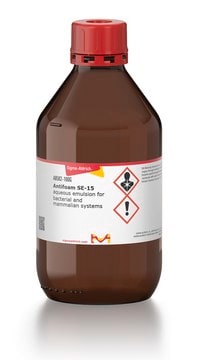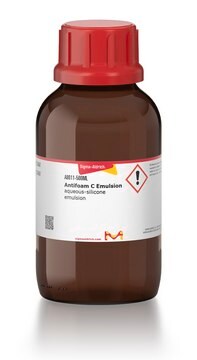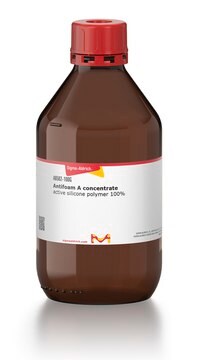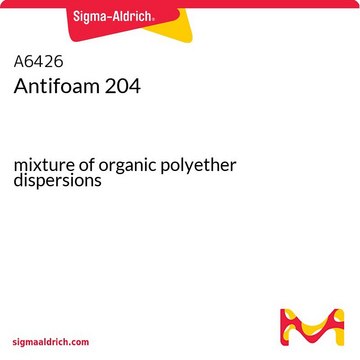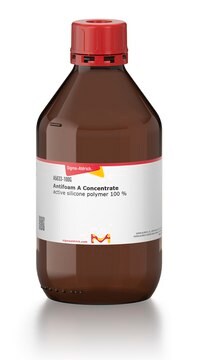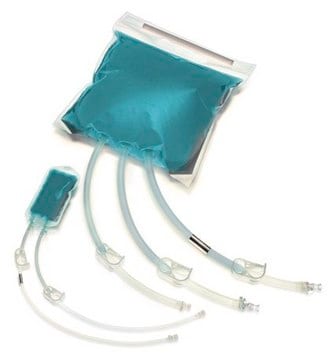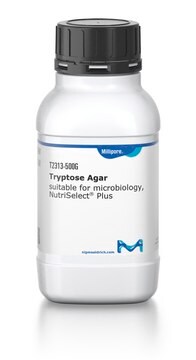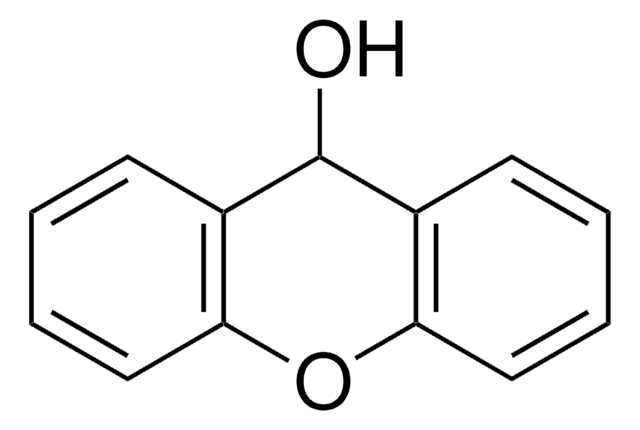A5758
Antifoam Y-30 Emulsion
aqueous-silicone emulsion
Autenticatiper visualizzare i prezzi riservati alla tua organizzazione & contrattuali
About This Item
Codice UNSPSC:
12161900
Prodotti consigliati
Descrizione generale
Antifoam Y-30 Emulsion is an aqueous emulsion containing 30% active silicon. It contains non-ionic emulsifiers different from those in Antifoam Emulsions B and C. It is designed to control foam in aqueous systems.
Antifoam is also known as defoamer. It is a chemical additive that reduces and hinders the formation of foam in industrial process liquids. It is used to prevent formation of foam or is added to break foam that is already formed.
Applicazioni
Antifoam Y-30 Emulsion is used for the following applications:
- Chemostat cultivation.
- Cultivation conditions, such as Fed-batch fermentation.
- Bacterial strains and growth conditions (used in all aerosol experiments).
Altre note
A 30% aqueous emulsion of Antifoam A concentrate.
Linkage
More easily dispersed in aqueous systems than Antifoam A concentrate.
Codice della classe di stoccaggio
10 - Combustible liquids
Classe di pericolosità dell'acqua (WGK)
WGK 3
Punto d’infiammabilità (°F)
Not applicable
Punto d’infiammabilità (°C)
Not applicable
Dispositivi di protezione individuale
Eyeshields, Gloves, type ABEK (EN14387) respirator filter
Certificati d'analisi (COA)
Cerca il Certificati d'analisi (COA) digitando il numero di lotto/batch corrispondente. I numeri di lotto o di batch sono stampati sull'etichetta dei prodotti dopo la parola ‘Lotto’ o ‘Batch’.
Possiedi già questo prodotto?
I documenti relativi ai prodotti acquistati recentemente sono disponibili nell’Archivio dei documenti.
I clienti hanno visto anche
Adrien Pagnier et al.
Proceedings of the National Academy of Sciences of the United States of America, 113(1), 104-109 (2015-12-25)
The synthesis and assembly of the active site [FeFe] unit of [FeFe]-hydrogenases require at least three maturases. The radical S-adenosyl-l-methionine HydG, the best characterized of these proteins, is responsible for the synthesis of the hydrogenase CO and CN(-) ligands from
Modeling of growth and energy metabolism of Pichia pastoris producing a fusion protein.
M. Jahic, J.C. Rotticci-Mulder, M. Martinelle, K. Hult, S-O. Enfors
Bioprocess and Biosystems Engineering, 24, 385-393 (2002)
Mehmedalija Jahic et al.
Microbial cell factories, 2(1), 6-6 (2003-07-23)
BACKGROUND: A temperature limited fed-batch (TLFB) technique is described and used for Pichia pastoris Mut+ strain cultures and compared with the traditional methanol limited fed-batch (MLFB) technique. A recombinant fusion protein composed of a cellulose-binding module (CBM) from Neocallimastix patriciarum
N Meinander et al.
Microbiology (Reading, England), 142 ( Pt 1), 165-172 (1996-01-01)
Recombinant Saccharomyces cerevisiae harbouring the xylose reductase (XR) gene XYL1 from Pichia stipitis was grown in anoxic chemostat culture at two different dilution rates. At each dilution rate a transient experiment, encompassing a shift in the sugar content of the
Divey Saini et al.
Tuberculosis (Edinburgh, Scotland), 92(2), 160-165 (2011-12-27)
A murine low dose (LD) aerosol model is commonly used to test tuberculosis vaccines. Doses of 50-400 CFU (24h lung CFU) infect 100% of exposed mice. The LD model measures progression from infection to disease based on organ CFU at
Il team dei nostri ricercatori vanta grande esperienza in tutte le aree della ricerca quali Life Science, scienza dei materiali, sintesi chimica, cromatografia, discipline analitiche, ecc..
Contatta l'Assistenza Tecnica.